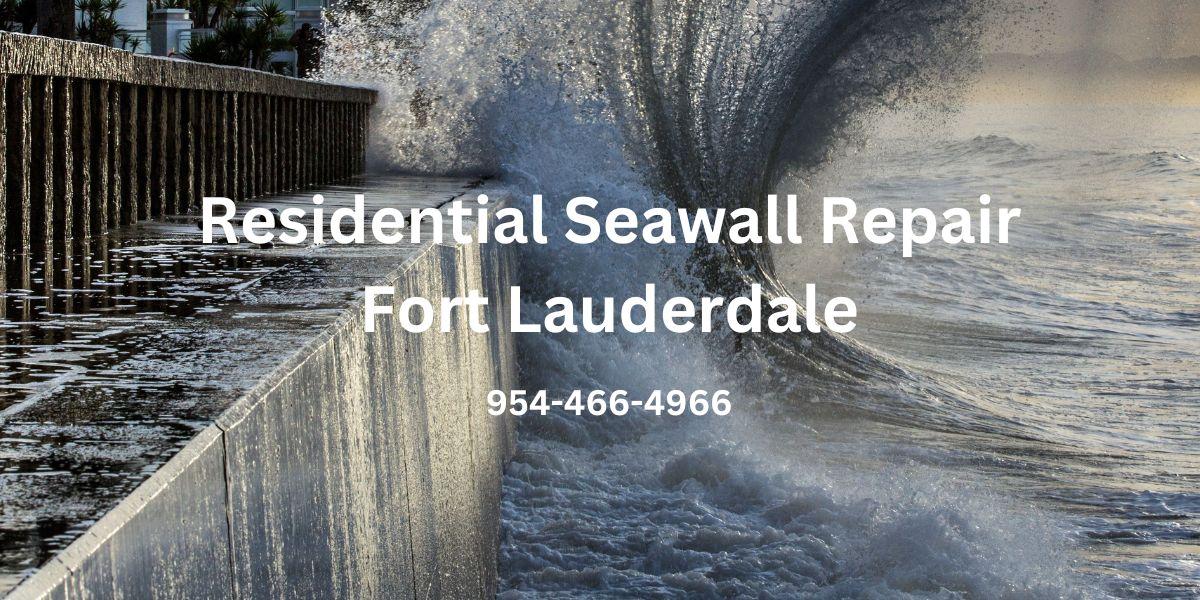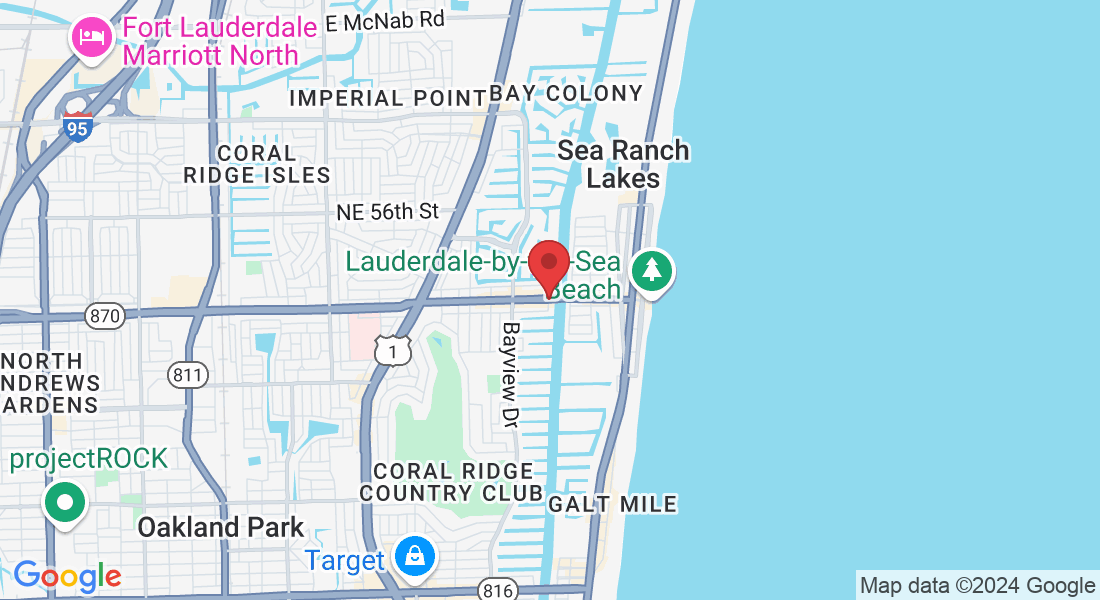
Residential Seawall Repair Fort Lauderdale
Residential seawall repair in Fort Lauderdale is an important topic for homeowners living near the water. Seawalls protect our homes from erosion and water damage, so it's crucial to keep them in good shape.
Many homes have seawalls because of the city's coastal location. These walls can be made of different materials like concrete, vinyl, or aluminum. Living in the Fort Lauderdale area we see many sea walls in need of repair. We also see many homes that have let their sea walls get past the point of needing repair and are in full blown replace mode.
Over time, seawalls can get damaged by waves, storms, and normal wear and tear. When this happens, they need to be fixed to keep protecting the property. By calling Seawall Repair Fort Lauderdale, you can stay ahead of the curve and keep your repairs to a minimum cost.
Sea Wall Repair Fort Lauderdale understands the importance of balancing savings for the home owner and making sure that when sea wall is reconstructed, it will last for a long time thereafter.
There are several signs that a seawall might need repair. Homeowners should look for cracks in the wall, leaning or bowing, and holes or gaps near the base. By seeing these issues early in the process it can save your seawall from major reconstruction.
It's a good idea to check your seawall at least twice a year for these problems.
If you notice any issues, it's best to get help from a professional right away. Waiting too long can make the damage worse and more expensive to fix. Seawall Repair Fort Lauderdale has experienced professionals who have been working doing seawall repair and seawall installation for over 20 years. We will work with you to come up with the best solution to your problem.
When it comes to fixing seawalls, there are different methods depending on the problem. One common repair is filling cracks and gaps with special materials that expand to seal the wall.
Another method is using foam to fill spaces under the seawall, which helps make it stronger. Sometimes, parts of the wall might need to be replaced if they're too damaged. This process is called polyurethane foam seawall repair. It is both environmentally friendly and less expensive than most other options.
Seawall Repair Fort Lauderdale has the experience necessary to fix your seawall correctly the first time. We will work with you to ensure you are satisfied with the plan we are implementing to correct your seawall issues. It's important to choose a good company for seawall repair. Look for ones with experience and good reviews. We offer free evaluations in a timely manner from the instant we receive your call.
This can help you understand what needs to be done and how much it might cost. Taking care of your seawall is cheaper than having to replace the whole thing. Regular maintenance can help your seawall last longer, sometimes up to 50 years or more.
This includes cleaning the wall, checking for problems, and fixing small issues before they get big.
In conclusion, residential seawall repair is an important part of owning a waterfront home in Fort Lauderdale. By keeping an eye on your seawall and fixing problems early, you can protect your property and avoid costly repairs in the future. Remember, a well-maintained seawall keeps your home safe from water damage and erosion for many years to come.
What makes polyurethane foam the preferred method for seawall repairs?
Polyurethane foam has become the preferred method for seawall repairs due to several key advantages:
Cost-effectiveness: Repairing a seawall using polyurethane foam injection is typically less than half the cost of replacement.This makes it a more economical option for property owners.
Minimal disruption: Unlike traditional methods that involve heavy equipment and can damage yards, landscaping, docks, and pool areas, polyurethane foam injection is less invasive. It can be installed efficiently with minimal disruption to the property.
Quick installation and return to use: Polyurethane foam repairs can be completed rapidly, allowing property owners to resume activity on and around the structure within hours after repair.
Versatility: Polyurethane foam can be used to stop high flow leaks, fill voids behind seawalls, and bind loose soil. It's effective for various types of seawall issues.
Soil stabilization: Single component polyurethane foams offer excellent soil penetrating, permeation, and soil aggregate stabilizing properties. This helps address the underlying causes of seawall deterioration by preventing soil erosion.
Environmental friendliness: Many polyurethane foam products used for seawall repair have been rigorously tested and certified for contact with recreational and commercial bodies of water, and even drinking water.
Longevity: Polyurethane foam repairs can significantly extend the life of a seawall, potentially doubling its lifespan.
Non-invasive application: The foam can be injected through small holes, avoiding the need for extensive excavation or replacement of large sections of the wall.
These benefits make polyurethane foam an innovative, efficient, and sustainable solution for seawall repairs, addressing many of the limitations associated with traditional repair methods.
Contact Seawall Repair Fort Lauderdale for further discussion on what type of repair method is best for your situation. Every seawall repair is different. We will help you determine the best course of action for your specific instance.
Are there any specific conditions where polyurethane foam is not recommended for seawall repairs?
While polyurethane foam is a versatile and effective solution for many seawall repair situations, there are some specific conditions where it may not be recommended or may have limitations:
Severe structural damage: If a seawall has extensive structural damage or is at risk of complete failure, polyurethane foam alone may not be sufficient. In these cases, more extensive repairs or complete replacement might be necessary.
Large voids or cavities: For extremely large voids behind the seawall, polyurethane foam might not be the most cost-effective solution. In such cases, a combination of methods or alternative approaches may be more suitable.
Active water flow: In situations with very high water pressure or active water flow through large cracks or holes, it can be challenging to apply polyurethane foam effectively. The foam may not have enough time to set and expand properly before being washed away.
Contaminated soil: If the soil behind the seawall is heavily contaminated with chemicals or pollutants, polyurethane foam may not be the best choice, as it could potentially interact with these contaminants.
Regulatory restrictions: Some areas may have specific regulations or environmental concerns that limit the use of certain types of polyurethane foams in marine environments.
Temporary fixes: If a property owner is looking for only a short-term solution before a planned major renovation or replacement, polyurethane foam might be considered overengineering for the situation.
Incompatible materials: Certain types of seawall construction materials may not bond well with polyurethane foam, reducing its effectiveness.
In these cases, alternative repair methods or a combination of techniques might be more appropriate. Seawall Repair Fort Lauderdale is prepared for all situations and will work with you and determine the best course of action. Like noted above, every situation is different and with each situation we will give our best recommendation and help the homeowner make the decision that makes the most sense.
